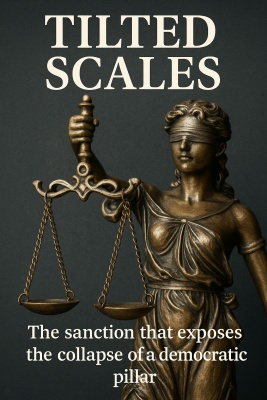Read, Like and Share
The sanction that exposes the collapse of a democratic pillar
It wasn’t corruption. It wasn’t censorship. It wasn’t political violence or populism. What finally drew the attention of the free world to Brazil was something deeper, more structural — the collapse of republican balance caused by a branch of power that abandoned its role as referee to become a partisan player.
The international sanction imposed by a Western democracy wasn’t based on ideology or political preference. It wasn’t a partisan act. It was an institutional warning. And the core reason is straightforward: when the branch meant to uphold impartial justice becomes an instrument of one side of the political spectrum, democracy starts to unravel and the world responds.
For nearly two decades, Brazil lived under a façade of political alternation. Different faces, same agenda. But in recent years, something more dangerous has emerged: a vital piece of the democratic machinery has gone off the constitutional rails. The robe, once a shield for liberty, became a sword for political combat. Impartiality gave way to selectivity. Legality was replaced by ideological convenience.
The world, weary of empty rhetoric about “full democracy,” is beginning to see the true nature of Brazil’s regime. The decision to sanction a high-level official is not isolated. It is symbolic. It sends a message to those who, under the pretense of defending order, are undermining liberty’s foundations. It’s a veiled but clear warning: a branch of power is amassing roles it was never meant to hold : legislating, investigating, judging, censoring, punishing, always in the same direction.
This is not about glorifying or condemning one political side. It’s about acknowledging that when the branch meant to be the final recourse becomes the first weapon, the republic becomes ill. And the clearest symptom of that illness is prior censorship, the silencing of a free press, the persecution of dissenting voices, and the manipulation of legal truth in favor of an “official narrative.”
Some still insist that any criticism of this process amounts to disinformation. They forget that democracy is not an end in itself, it’s a method of coexistence, grounded in protected dissent. When dissent becomes a crime, democracy ceases to be a method and turns into a farce.
The sanction, though modest compared to the gravity of the situation, is the first tangible step from an international community that is finally seeing past the diplomatic gloss. It is not a punishment of a country. It is a warning to the branch of power that has lost its way. A mirror held up to those who believe they are above the Constitution, above the ballot box, above the very people they claim to protect.
This is a moment for clarity. And for Brazilians living abroad, free from the constraints of a domesticated narrative , the duty is even greater: to denounce, to inform, to connect. Because when the guardian of law becomes the enforcer of silence, it is often the voices of exiles , that carry the hope of restoring a nation to its democratic axis.


